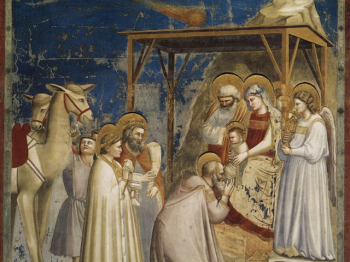Epiphany: Hope Opens to the Peoples

“Behold, wise men from the East came to Jerusalem” (Mt 2:1).
Matthew, the author of the first of the four canonical Gospels, dwells on one of the most intriguing events connected to the birth of Jesus. He is able to do so because of either a concise and impressive knowledge, or perhaps it is his familiarity with the historical and geographical facts of the early life of the Lord. In doing so, the Evangelist seems to open a new theological-narrative line of essential importance; if the former concerned the “Expected One” in the genealogical line of the patriarch Abraham and King David (cf. Mt 1:1) according to the vision traced by the prophet Isaiah (Behold, the virgin shall conceive and bear a son - 7:14), the second takes shape through the attribution of the meaning of the name. He shall be called Emmanuel, which means God with us (cf. Is 7:14 and Mt 1:23). A God with us who, for this reason, involve all peoples.
This second theological-narrative line is summarized in Matthew chapter two and deals with the Magi’s visit and the related events. “Now when Jesus was born in Bethlehem of Judea in the days of Herod the king, behold, wise men from the East came to Jerusalem, saying, “Where is he who has been born king of the Jews?” (cf. Mt 2:1-2). In this way, the newborn Jesus fulfills not only Israel’s expectation but also the very yearning of the peoples.
All history and every human life are, in themselves, a journey and an anticipation. This is even more evident in History that becomes sacred by the insertion of the Most High into it. It is a grand narrative of 'expectations' and 'journeys', that commences with Abraham, who moves from Ur of the Chaldeans towards the Land indicated to him by God, to that People who, guided by the pillar of fire, travel through the desert towards the Land of the Fathers; and beyond. In every biblical journey, the blessing is never missing as a companion: The Lord bless you and keep you and give you peace (cf. Nm 6:23). A blessing that, as St Paul taught, in Jesus Christ is extended to all peoples and at the same time involves redemption, forgiveness of sins, and richness of grace (cf. Eph 1:1-7).
For Sacred Scripture, all peoples are, therefore, in expectation and on a journey, because pilgrimage –whether that be real, intellectual, or existential- belong to the human condition. It is neither the domain of angels nor demons. Christ himself, in his incarnation, became a pilgrim.
The mysterious characters from the East mentioned in Matthew's Gospel represent those peoples whom, in their expectations, follow a star (cf. Mt 2:2), and seek a guide: they seek that hope that holds the meaning of existence and the way of existing in every human being.
In a suggestive scenography, the author of Psalm 72(71) had foreseen an extraordinary centripetal movement of the peoples towards the “great King”. May the desert tribes bow before him, the kings of Tarshish and the islands, the kings of Sheba and Seba offer gifts, all kings bow down and all peoples serve him (cf. 9-11). This captivating vision precedes a new scenario, that of the mission of the Church that commences from the Risen Lord and extends towards the peoples. Christ, the Blessing to be poured out on all peoples. The missionary is the one who transforms the hope, the expectation of the peoples into “Blessing” by going towards those who are in search of God in Christ.
Epiphany: here is the manifestation of Jesus’ humanity to the Magi. Yet, throughout the public life of Christ, we witness other epiphanies: from the Baptism in the Jordan (This is my beloved Son, with whom I am well pleased - Mt 3:17), to the Transfiguration on mount Tabor (This is my beloved Son - Mt 17:5); from the Crucifixion of the Righteous One (Truly this was the Son of God! - Mt 27:54), to his Resurrection which concludes the last historical-theological thread of the Lord’s epiphanies.
Pope Benedict XVI wrote that “in hope we were saved” (Rom 8:24) and added: “Redemption is offered to us in the sense that we have been given hope, trustworthy hope, by virtue of which we can face our present: the present, even if it is arduous, can be lived and accepted if it leads towards a goal, if we can be sure of this goal, and if this goal is great enough to justify the effort of the journey” (Encyclical Letter Spe Salvi, n.1).
Pope Francis has reaffirmed: “Spes non confundit, hope does not disappoint” (Rom 5:5), since “In the heart of each person, hope dwells as the desire and expectation of good things to come, despite our not knowing what the future may bring. Even so, uncertainty about the future may at times give rise to conflicting feelings, ranging from confident trust to apprehensiveness, from serenity to anxiety, from firm conviction to hesitation and doubt. Often we come across people who are discouraged, pessimistic and cynical about the future, as if nothing could possibly bring them happiness. For all of us, may the Jubilee be an opportunity to be renewed in hope. God’s word helps us find reasons for that hope” (Bull of Indiction of the Ordinary Jubilee of the Year 2025, n.1).
Fernando Cardinal Filoni
Grand Master
(January 3, 2025)



